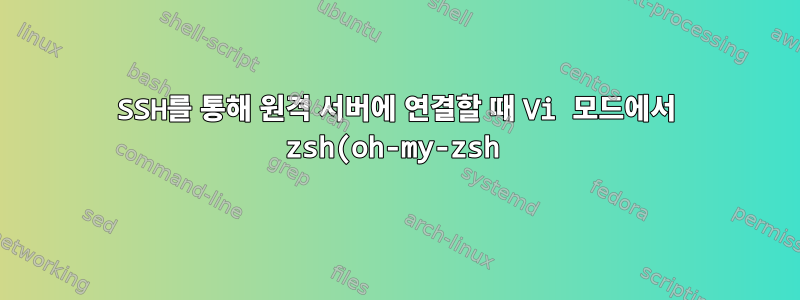%20%EC%8B%A4%ED%96%89.png)
SSH를 사용하여 원격 서버에 연결하고 Vi 모드에서 세션을 실행하고 싶습니다. 나는 bash에서 이 작업을 수행하는 방법을 알아냈습니다.
ssh username@server -t 'bash -o vi'
하지만 zsh에서도 동일한 작업을 수행해야 합니다(차이가 있다면 oh-my-zsh). 이것을 달성하는 방법을 어디서도 찾을 수 없습니다. "zsh -o vi"를 시도했지만 작동하지 않았습니다. 올바른 명령을 찾으면 서버에 ssh를 연결하고 편집 모드를 Vi로 설정하는 바로가기 스크립트를 생성하겠습니다.
서버의 구성 파일 수정을 제안하지 마십시오. 저는 이 서버를 사용하는 많은 사용자 중 한 명이며 불행하게도 우리는 동일한 계정을 사용하므로 세션이 나만을 위해서만 Vi 모드에서 실행되고 다른 사용자를 위해서도 실행되는 것이 중요합니다. 어떤 조언이라도 진심으로 감사드립니다!
원격 서버에 있는 ~/.zshrc의 내용(모든 주석이 제거됨):
export ZSH="/root/.oh-my-zsh"
ZSH_THEME="risto"
plugins=(
git
ruby
gem
rails
)
source $ZSH/oh-my-zsh.sh
oh-my-zsh의 표준 zshrc와 거의 같습니다. 아마도 기본 테마를 변경하고 플러그인을 한두 개 추가했을 것입니다.
/root/.oh-my-zsh/oh-my-zsh.sh도움이 된다면 내용은 다음과 같습니다 .
# Set ZSH_CACHE_DIR to the path where cache files should be created
# or else we will use the default cache/
if [[ -z "$ZSH_CACHE_DIR" ]]; then
ZSH_CACHE_DIR="$ZSH/cache"
fi
# Migrate .zsh-update file to $ZSH_CACHE_DIR
if [ -f ~/.zsh-update ] && [ ! -f ${ZSH_CACHE_DIR}/.zsh-update ]; then
mv ~/.zsh-update ${ZSH_CACHE_DIR}/.zsh-update
fi
# Check for updates on initial load...
if [ "$DISABLE_AUTO_UPDATE" != "true" ]; then
env ZSH=$ZSH ZSH_CACHE_DIR=$ZSH_CACHE_DIR DISABLE_UPDATE_PROMPT=$DISABLE_UPDATE_PROMPT zsh -f $ZSH/tools/check_for_upgrade.sh
fi
# Initializes Oh My Zsh
# add a function path
fpath=($ZSH/functions $ZSH/completions $fpath)
# Load all stock functions (from $fpath files) called below.
autoload -U compaudit compinit
# Set ZSH_CUSTOM to the path where your custom config files
# and plugins exists, or else we will use the default custom/
if [[ -z "$ZSH_CUSTOM" ]]; then
ZSH_CUSTOM="$ZSH/custom"
fi
is_plugin() {
local base_dir=$1
local name=$2
test -f $base_dir/plugins/$name/$name.plugin.zsh \
|| test -f $base_dir/plugins/$name/_$name
}
# Add all defined plugins to fpath. This must be done
# before running compinit.
for plugin ($plugins); do
if is_plugin $ZSH_CUSTOM $plugin; then
fpath=($ZSH_CUSTOM/plugins/$plugin $fpath)
elif is_plugin $ZSH $plugin; then
fpath=($ZSH/plugins/$plugin $fpath)
else
echo "[oh-my-zsh] plugin '$plugin' not found"
fi
done
# Figure out the SHORT hostname
if [[ "$OSTYPE" = darwin* ]]; then
# macOS's $HOST changes with dhcp, etc. Use ComputerName if possible.
SHORT_HOST=$(scutil --get ComputerName 2>/dev/null) || SHORT_HOST=${HOST/.*/}
else
SHORT_HOST=${HOST/.*/}
fi
# Save the location of the current completion dump file.
if [ -z "$ZSH_COMPDUMP" ]; then
ZSH_COMPDUMP="${ZDOTDIR:-${HOME}}/.zcompdump-${SHORT_HOST}-${ZSH_VERSION}"
fi
if [[ $ZSH_DISABLE_COMPFIX != true ]]; then
source $ZSH/lib/compfix.zsh
# If completion insecurities exist, warn the user
handle_completion_insecurities
# Load only from secure directories
compinit -i -C -d "${ZSH_COMPDUMP}"
else
# If the user wants it, load from all found directories
compinit -u -C -d "${ZSH_COMPDUMP}"
fi
# Load all of the config files in ~/oh-my-zsh that end in .zsh
# TIP: Add files you don't want in git to .gitignore
for config_file ($ZSH/lib/*.zsh); do
custom_config_file="${ZSH_CUSTOM}/lib/${config_file:t}"
[ -f "${custom_config_file}" ] && config_file=${custom_config_file}
source $config_file
done
# Load all of the plugins that were defined in ~/.zshrc
for plugin ($plugins); do
if [ -f $ZSH_CUSTOM/plugins/$plugin/$plugin.plugin.zsh ]; then
source $ZSH_CUSTOM/plugins/$plugin/$plugin.plugin.zsh
elif [ -f $ZSH/plugins/$plugin/$plugin.plugin.zsh ]; then
source $ZSH/plugins/$plugin/$plugin.plugin.zsh
fi
done
# Load all of your custom configurations from custom/
for config_file ($ZSH_CUSTOM/*.zsh(N)); do
source $config_file
done
unset config_file
# Load the theme
if [[ "$ZSH_THEME" == "random" ]]; then
if [[ "${(t)ZSH_THEME_RANDOM_CANDIDATES}" = "array" ]] && [[ "${#ZSH_THEME_RANDOM_CANDIDATES[@]}" -gt 0 ]]; then
themes=($ZSH/themes/${^ZSH_THEME_RANDOM_CANDIDATES}.zsh-theme)
else
themes=($ZSH/themes/*zsh-theme)
fi
N=${#themes[@]}
((N=(RANDOM%N)+1))
RANDOM_THEME=${themes[$N]}
source "$RANDOM_THEME"
echo "[oh-my-zsh] Random theme '$RANDOM_THEME' loaded..."
else
if [ ! "$ZSH_THEME" = "" ]; then
if [ -f "$ZSH_CUSTOM/$ZSH_THEME.zsh-theme" ]; then
source "$ZSH_CUSTOM/$ZSH_THEME.zsh-theme"
elif [ -f "$ZSH_CUSTOM/themes/$ZSH_THEME.zsh-theme" ]; then
source "$ZSH_CUSTOM/themes/$ZSH_THEME.zsh-theme"
else
source "$ZSH/themes/$ZSH_THEME.zsh-theme"
fi
fi
fi
답변1
쉘에 들어가면 간단히 실행하십시오.
bindkey -v
직접 출처 ssh:
ssh -t username@server 'VISUAL=vi zsh'


